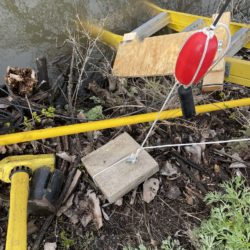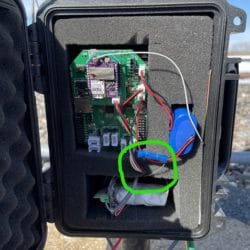Forum Replies Created
-
AuthorPosts
-
Mayer, if the CR1220 battery powering the internal clock is low on voltage this could be causing a time mismatch and no connection during the cellular connection sequence.
Fiona, I am using a system I designed to suspend my CTD sensor one foot above the bottom of a pond by attaching the sensor to a float which is anchored to a concrete block (see attached photo).
If you have a mending plate on the back of your logger box you can use a long hose clamp to attach it to the dock.
Attachments:
I see it’s resolved. Awesome. Thank you all.
It did seem to make a difference in the short term but the problem started again. My latest fix was to ground the analogue signal cable drain wire to the battery negative. I’ve done this now on 4 rain gauge systems and it seems to help, although one of the systems is still showing tips with no rain.
Attachments:
The site (SAVPW-RG) was not created after mid-December. It was created closer to that Aug. 2019 date.
@heather, Thanks for checking.
Both accounts were set up before the mid-December release. The personal account was around 8/13/19 and the organizational account was around 10/3/19.
2021-09-17 at 4:13 PM in reply to: Mayfly not writing to SD card = possibly a libraries issue? #15903If they wrote to the SD card in the lab but not the field could it be a power supply issue?
Shannon, yes, the outer jacket color I received is black. Good to know about the possibility of sensor damage or bricking.
They did not give me a pinout, I just did trial and error of figure it out. I think next time I’ll purchase a stereo jack adaptor and try connecting it to the Mayfly that way.
Shannon, I received 3 Meter CTD-10 (HYDROS 21) sensors this week and they did change the wire colors. For me brown is power (VCC) and orange is data (D2). I also had to use the b_address_change sketch to change the SDI-12 address from 0 to 1.
-
AuthorPosts

 Welcome to EnviroDIY, a community for do-it-yourself environmental science and monitoring. EnviroDIY is part of
Welcome to EnviroDIY, a community for do-it-yourself environmental science and monitoring. EnviroDIY is part of 
